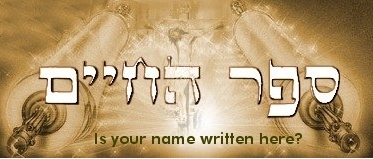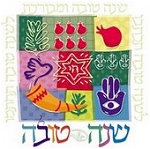|
Should "Christians" observe the Jewish festival of Rosh Hashanah? Surely you know my answer, chaverim, but I thought I'd provide a few reasons why we observe this special time for the sake of our Christian friends who might not understand the importance of the moedim (appointed times). What follows is a "short list" of reasons; for more information, scroll down and read the various entries regarding teshuvah (repentance):
- First, the LORD God is indeed the King of all the earth, our Creator and Redeemer. He is Melech Gadol al-kol-ha'aretz, (ΧΦΆΧΦΆΧΦ° ΧΦΌΦΈΧΧΦΉΧ Χ’Φ·ΧΦΎΧΦΌΦΈΧΦΎΧΦΈΧΦΈΧ¨ΦΆΧ₯), a "great King over all the earth" (Psalm 47:2). Though Christians should acknowledge His righteous rule and Kingship at all times, Rosh Hashanah is a "sanctified reminder" of God's creative authority in our lives. Yeshua (Jesus) is called the Mashiach (ΧΦΈΧ©ΧΦ΄ΧΧΦ·), a term that denotes His Kingly dignity and royalty (this idea is unfortunately obscured by the Greek word "Christ"). Yeshua is also borei Olam - the Creator and Sustainer of all creation (Col. 1:16). He is coming to rule and reign from Jerusalem (Zion) in the near future. Christians will be judged according to their deeds of service (2 Cor. 5:10) and the world system (and Satan) will be judged during the Great Tribulation period that precedes the Second Coming. Just as the heavenly shofar was sounded from Sinai, so it will be one day sounded from Zion (Isa. 27:13).
As the only true King and Judge, God indeed has a Sefer HaChayim (Book of Life) as well as a Sefer Ha-Metim (Book of Death). The Scriptures clearly warn that on the Day of Judgment to come, anyone's name not found written in the Book of Life will be thrown into the lake of fire (Rev. 20:15). The Kingship of our LORD should be of great interest to those who wish to honor Him...
- Second, the month of Elul and the preparation for Rosh Hashanah reminds us to be ready for the soon appearance of King Yeshua our LORD. Though we do not know the exact day or hour of His return to possess His kingdom on earth, we are commanded to watch and be ready for His soon appearance. We ought, therefore, be in a constant state of repentance (teshuvah) as we seek to humble ourselves and walk with our God.
The New Testament links teshuvah with salvation (ΧΦ°Χ©ΧΧΦΌΧ’ΦΈΧ) itself. Yeshua's first message was "Repent and believe the gospel (ΧΦΌΦ°Χ©ΧΧΦΉΧ¨ΦΈΧ)" (Mark 1:15), and Paul linked teshuvah with confession and trust in the saving work of the Messiah on our behalf (Rom. 10:8-13). Teshuvah implies a response to the Person of Yeshua that is demonstrated through confession that He is none other than YHVH, the LORD of Compassion and grace. The sound of the shofar is meant to awaken our hearts and to prepare for coming judgment.
- Third, Rosh Hashanah itself, or rather Yom Teru'ah, has prophetic significance in the life of the Christian. The blowing of the shofar is prophetic of the rapture of the church, where those who are part of the Bride of Mashiach, the "church," will experience everlasting transformation:
"Behold, I show you a mystery; We shall not all sleep, but we shall all be changed, in a moment, in the twinkling of an eye, at the last trumpet (shofar): for the trumpet (shofar) shall sound, and the dead shall be raised incorruptible, and we shall be changed." (1 Cor. 15:51)
Note that the Talmud states that on Rosh Hashanah the dead will be raised (Rosh Hashanah 16b). This corresponds to the "last trump" mentioned by the Apostle Paul (1 Cor. 15:52).
- Fourth, the Tashlikh (ΧͺΦΌΦ·Χ©ΧΦ°ΧΦ΄ΧΧΦ°) ceremony reminds us that our LORD is a God of new beginnings, and even if we have sinned and fallen away from Him, He is faithful to restore us and cast our sins away from us. After all, God sent His only Son Yeshua to be our Sin-Bearer and Kapparah (atonement), so we can take comfort in His forgiveness when we earnestly seek to repent from the harm we have done and begin anew with God.
- Fifth, we should be grateful to the LORD for writing our names in the Lamb's Book of Life, or Sefer HaChayim (Χ‘Φ΅Χ€ΦΆΧ¨ ΧΦ·ΧΦ·ΧΦΌΦ΄ΧΧ). Of course we don't believe that we are made acceptable in the LORD's eyes by means of our own works of righteousness (Titus 3:5-6), but that doesn't excuse us from being without the "fruit of the Spirit" in our lives. For more information on this, see "Yom Kippur and the Gospel."

- Sixth, the Akedat Yitzchak ("Binding of Isaac") is a major theme of Rosh Hashanah. As he went to sacrifice his beloved son upon the altar at Moriah, Abraham prophetically said: "God will provide for himself the lamb" (ΧΦ±ΧΧΦ΄ΧΧ ΧΦ΄Χ¨Φ°ΧΦΆΧΦΎΧΦΌΧΦΉ ΧΦ·Χ©ΦΌΧΦΆΧ). After binding Isaac and raising the knife, however, the Angel of the LORD intervened and Abraham was given a ram as substitute. According to Jewish tradition, God told Abraham that the ram's horn (shofar) should be blown on Rosh Hashanah to remind the people of the substitutionary sacrifice provided by the LORD Himself -- an echo of the very First Sacrifice offered in Eden. In light of this, how much more then should we remember the sacrifice of Yeshua the Great Lamb of God during this time? (For more information, see the article, "The Gospel in the Garden.")

- Finally, we anticipate the prophetic fulfillment of the LORD's covenant faithfulness to Israel when we understand that the Yamim Nora'im ("Days of Awe") foreshadow the future repentance of national Israel in the days to come. This pictures the Great Tribulation and Yom Adonai - the great Day of the LORD - that arrives just before national Israel's ultimate shuvah (return). Yom Kippur is the Holiday that pictures the full restoration of Israel to all her covenant promises with Yeshua as the recognized Kohen Gadol (High Priest) of the New Covenant. The Brit Chadashah will be embraced and Yeshua will be revealed as Israel's Savior, LORD, and Deliverer. Then "all Israel shall be saved" (Rom. 11:26).
So yes, for these and other reasons a Christian should observe the significance of Rosh Hashanah (and the other Biblical "appointed times"). For more information, please see the Rosh Hashanah pages. Shanah Tovah!

|




